- Home
- Various Authors
The Conan Compendium Page 24
The Conan Compendium Read online
Page 24
Another field, even broader, lay on the far side of the road. Conan did not think flight would serve the Cimmerians. A savage grin on his face, he turned to the others who had come so far from their northern homes. "If we kill a few of them, the rest will flee," he said. "We can do it!"
There, however, he miscalculated. Talorc was a good bowman despite his tears, and knocked down two Aquilonians before the rest could close. But that did not discourage the ones who still lived. On they came, shouting King Numedides'
name. The battle that followed would be forever nameless, but it was as fierce as many bigger fights of which the chroniclers sang for centuries.
Talorc fell almost at once, fulfilling his own dark prophecy. He wounded one of the two Aquilonians who had assailed him. Another Cimmerian soon slew the man. The fight went on without them. Neither side showed even the slightest interest in flight. It soon became clear things would end only when either Cimmerians or Aquilonians had no one left who could stand on his feet or wield a weapon.
Up until then, Conan had dealt out wounds in plenty, but had received hardly more than scratches. In that fight he learned edged steel could bite his flesh, too, and that it was no more pleasant when it did than he would have guessed. But not a cry of pain escaped him when he was hurt; he would not yield to wounds any
more than he had yielded to his father's hard hands. And, since none of the gashes he received was enough to cripple him, he went on fighting, too.
One of the Aquilonians was a great bear of a man: not quite so tall as Conan, perhaps, but even wider through the shoulders, with enormous arms, a thick chest, and an even thicker belly that hung down over the top of his breeches. He was a farmer, not a soldier; his only weapon was a spade. But he swung it with a wild man's lunatic savagery. It split flesh, broke bones, shattered skulls. One Cimmerian after another went down before him.
Conan, likewise, was the champion for the men of the north. After half an hour, those two were the only fighters not weltering in their gore. Conan hefted his father's axe. The hulking Aquilonian advanced on him, still clutching that blood-dripping spade. A half-crazed grin stretched across his face. "One of us dies," he said.
"Aye." Conan nodded. Here was a foe he could respect. "One of us does." He threw the axe, a trick he had taught himself between bouts of brigandage. Its head should have torn out the Aquilonian's heart.
Clang! Fast as a striking serpent, the big man knocked the flying axe aside with the spade. His grin got wider. "Looks like that one's going to be you."
Conan made no reply. He did the last thing the Aquilonian could have expected: he rushed straight for him. The foe hesitated for a fatal heartbeat, wondering which blow to use to strike down the apparent madman he faced. But Conan's madness had method to it; the Aquilonian had just started to swing back the spade when Conan seized the handle just below the blade.
He heaved and twisted. So did the enormous Aquilonian. Whichever of them could wrest the spade from the other would live. His enemy would die. It was as simple as that. The Aquilonian's first couple of jerks on the handle were almost contemptuous. He had never yet met a man who could match his strength.
But then he grunted in surprise. He set his feet. He took a better grip. The youth who opposed him might have been made of iron and leather and powered by a lion's heart, or a dragon's. Strain as the Aquilonian would, he could make no
progress against him. Indeed, he felt himself beginning to fail. A few more twists, and he would be without the weapon that had worked such slaughter.
"No!" he cried hoarsely, and tried to stamp on Conan's foot. But that foot was not there when the Aquilonian's boot crashed down. And, distracted from the struggle over the spade, the Aquilonian felt it rip from his fingers. "No!" he shouted once more, this time in despair and disbelief. That was the last word that ever passed his lips.
Breathing hard, Conan stood over his corpse for a moment. Then he threw aside the murderous spade. It had served him well enough, but he knew there were better weapons. He had his choice of any on the field now, and of the loot his comrades and their foes had carried.
His father's axe on his shoulder, a fine sword on his hip, his belt pouch heavy with silver lunas and golden rings, he strode down the road toward Tarantia.
A curious thing happened then. As long as Conan was part of a band of Cimmerians, all the Aquilonians in the countryside had done their best to hunt him down. When he walked along by himself, they forgot all about him. One lone youth, they seemed to say to themselves, could never threaten their grip on this kingdom. Knights who might well have slain him on sight had they found him in company with others of his kind rode past him without a second glance ―sometimes even without a first.
And the deeper into Aquilonia he got, the more he began to see that the people who lived on the land did not know him for a Cimmerian at all. They should have; he resembled them no more than a wolf takes after a lap dog. But he heard one peasant woman murmur, "How big and strong they grow them in Gunderland!" to another as he walked by. He did not catch what the second woman said in reply, but it sent both of them into a fit of giggles.
Obscurely annoyed without knowing why, Conan kept on toward the capital without giving the slightest indication he had heard the peasant women or noticed them in any way. For some unfathomable reason, that only set them giggling again.
Sometimes he would stop and chop wood or pitch hay for a meal and a place to sleep. Even his bad Aquilonian got taken for a frontier accent, not a barbarous one. He began to wonder about the ignorant folk who lived near the heart of this kingdom. The Bossonians and Gundermen he'd known had been enemies, aye, but worthy enemies. A lot of the people near Tarantia, shielded for generations by the rougher men who dwelt closer to the border, would not have lasted long had they had to defend their holdings against raiders from the north.
They did not even seem to know how lucky they were to be so shielded. Conan was drinking wine in a tavern when an Aquilonian at the next table spoke to his friend: "They say the barbarians have run us out of that Cimmeria place."
The friend's jowls wobbled as he swigged from his mug of wine. They wobbled again when he shrugged. "Well, so what?" he said. "Mitra, I don't know what we wanted with such a miserable country to begin with."
"Oh, it wasn't us ―not folk like you and me," said the first man wisely. "It was those miserable frontiersmen. All they do is make babies, and they were looking for somewhere to put more of them."
"Well, they didn't find it there." His friend laughed. "Not my worry any which way."
"Nor mine," said the first man. "Here, drink up, Crecelius, and I'll buy you another round."
They too were enemies. Even so, Conan wanted to pound their heads together. He doubted whether it would do any good, though. They were so sunk in sottish stupidity, nothing was likely to knock sense into their thick skulls.
Another thought crossed his mind later that day, after he had left the tavern behind. If the ordinary folk of Aquilonia had this view of the Cimmerian expedition, what did King Numedides think about it? Up until now, Conan had always assumed the King of Aquilonia would be gnashing his teeth in fury over his failure in the north. Now, suddenly, the blacksmith's son wondered. Could it be that Numedides was as indifferent to the disaster as so many of his subjects seemed to be?
What sort of a sovereign was Numedides if in fact he did not care? Conan laughed gustily and shrugged. As if the doings and thoughts of the King of Aquilonia could possibly matter to him!
Villages grew thicker on the land. Some of them were more than villages: some were towns. Conan eyed them with a hunter's unrelenting hunger. How long had it been since anyone plundered these places? The pickings would be rich indeed if anyone could.
Conan was walking along a hedgerow taller than a man when he heard argument from beyond it. Exasperation in his voice, a man was saying, "Everything will be fine, Selinda."
"Oh, it will, will it?" exclaimed Selinda shrilly. "I think those barbarians
will cut your throat as soon as you go out on the road."
"They aren't anywhere close to here," said the man. "And the soldiers are driving them back. Everybody says so. And my onions need to go to Tarantia. We won't get any money if they don't."
His wife ―it could be none other―let out another squawk. "I don't like it, Renorio. I don't like it at all."
When Conan emerged from beyond the hedgerow, they both suddenly fell silent.
They stood beside a ramshackle wagon that was, sure enough, piled high with onions. A bored horse dozed in harness. A shrewd smirk crossed Renorio's face and then, as quickly, vanished. He pointed to Conan. "You there, fellow! Can you drive a wagon?"
"Aye." Conan had never tried in his life, but had too much pride to admit there was anything he could not do.
Neither Renorio nor Selinda, plainly, had the slightest notion he was one of the fearsome barbarians who alarmed them. The farmer said, "How would you like to make two lunas ―one now, the other when you bring back the wagon?"
"What you want me to do?" asked Conan.
His accent did not faze the Aquilonian, either. "Take these onions to my brother-in-law in the great market square in Tarantia. Help Polsipher unload them, then bring the wagon back here," answered Renorio. "Two lunas."
By his greasy smile, Conan suspected he would not readily part with the second silver coin. Nevertheless, the blacksmith's son nodded. "I do this."
"Good. Good! Climb on up, then," said Renorio. Conan did, as if he had done so a thousand times before. He waited. Reluctantly, Renorio gave him the first half of the promised payment. With a fine show of authority, he flicked the reins. The horse snorted in surprise ―and perhaps derision ―and began to walk. Behind Conan, the farmer spoke triumphantly to his wife: "There. Now you don't have to worry any more. Are you happy? You don't look happy. You're never happy, seems to me."
Selinda screeched at him. They went back to arguing.
Conan began experimenting. Well before he got to Tarantia, he learned how to use the reins to make the horse start and stop and turn to the left and right. It all seemed easy enough. When the Cimmerian came to the capital of Aquilonia, he had no trouble finding the great market square, for a stream of wagons of all sizes flooded into it. He bawled Polsipher's name until someone answered. Renorio's brother-in-law did not seem unduly surprised at finding a stranger on the wagon; maybe the farmer had hired others before.
They unloaded the wagon. Like Renorio, Polsipher had no idea Conan was a Cimmerian. Conan climbed back up on the wagon and drove away. Polsipher called after him: "Turn around! The farm's back that way!"
As if he could not hear, Conan cupped a hand behind his ear and kept on in the direction he had chosen. Now that he had seen Tarantia, he wanted to learn what lay beyond it ― and riding had proved easier than walking. He would not get his second silver luna, if Renorio ever would have given it to him. But the farmer would not get his wagon or his sleepy horse. Conan liked that bargain fine. If
Renorio did not, too bad for him. Conan rode out of the city and off to the south and east. He had already begun to learn the trade of thief.
Legions of the Dead
Conan, born in the bleak, cloud-oppressed northern hills of Cimmeria, was known as a fighter around the council fires before he had seen fifteen snows. In that year, the Cimmerian tribesmen forgot their feuds and joined forces to repel the Gundermen who, pushing across the Aquilonian frontier, had built the frontier post of Venarium and begun to colonize the southern marches of Cimmeria. Conan was one of the howling, blood-mad horde that swept out of the northern hills, stormed over the stockade with sword and torch, and drove the Aquilonians back to their former border.
At the sack of Venarium, still short of his full growth, Conan already stood six feet tall and weighed 180 pounds. He had the alertness and stealth of the born woodsman, the iron-hardness of the mountain man, the Herculean physique of his blacksmith father, and a practical familiarity with knife, axe, and sword.
After the plunder of the Aquilonian outpost, Conan returns for a time to his tribe. Restless under the conflicting urges of his adolescence, his traditions, and his times, he becomes involved in a local feud and is not sorry to leave his village. He joins a band of Æsir in raiding the Vanir and the Hyperboreans. Some of the Hyperborean citadels, however, are under control of a caste of widely feared magicians, called Witchmen, and it is against one of these strongholds that Conan finds himself taking part in a foray.
1 • Blood on the Snow
A deer paused at the brink of the shallow stream and raised its head, sniffing the frosty air. Water dripped from its muzzle like beads of crystal. The lingering sun gleamed on its tawny hide and glistened on the tines of its branching antlers.
Whatever faint sound or scent had disturbed the animal was not repeated. Presently it bent to drink again from the frigid water, which rushed and bubbled amid crusts of broken ice.
On either side of the stream, steep banks of earth lay mantled in the new-fallen snow of early winter. Thickets of leafless bush grew close together under the somber boughs of the neighboring pines; and from the forest beyond, nothing could be heard but the ceaseless drip, drip of melting snow. The featureless leaden sky of the dying day scarcely seemed to clear the tops of the trees.
From the shelter of the woods, a slender javelin darted with deadly precision; and at the end of its arc, the long shaft caught the stag off guard and sank behind its shoulder. The stricken creature bolted for the far side of the creek; then staggered, coughed blood, and fell. For a moment or two it lay on its side, kicking and struggling. Then its eyes glazed, its head hung limply, and its heaving flanks grew still. Blood, mixed with froth and foam, dribbled from its sagging jaws to stain the virgin snow a brilliant crimson.
Two men emerged from the trees and studied the snowy landscape with searching eyes. The larger and older, plainly in command, was a giant of a man with massive shoulders and long, heavily muscled arms. The swell of his mighty chest and shoulders was visible beneath the cloak of fur that enveloped his stalwart figure and the coarse, baggy woolens he wore beneath the cloak. A broad belt of rawhide with a golden buckle held his garments around him, and a hood of wolf fur, forming part of the cloak, obscured his face.
Now pushing back the hood to peer about, he revealed a head of curling golden hair, slightly streaked with gray. A short, roughly trimmed beard of the same hue clothed his broad cheeks and heavy jaw. The color of his hair, his fair skin and ruddy cheeks, and his bold blue eyes marked him as one of the Æsir.
The youth beside him differed from him in many ways. Scarcely more than a boy, he was tall and brawny for his age―almost as tall as the full-grown Northman beside him―but lean and wiry rather than massive. He was dark and sullen, with straight, coarse black hair hacked off at the nape, and the skin of his somber visage was either naturally swarthy or heavily tanned. Under heavy black brows, his eyes were as blue as those of the giant at his elbow; but whereas the golden warrior’s eyes sparkled with the joy of the hunt and zest for the kill, those of the dark youth glowered like the eyes of some wild and hungry predator. Unlike his bearded companion, the young man’s beard was shaven clean, although a dark stubble shadowed his square jaw.
The bearded man was Njal, a jarl or chieftain of the Æsir and leader of a band of raiders known and feared on the wintry borders between Asgard and Hyperborea. The youth was Conan, a renegade from the rugged, cloud-haunted hills of Cimmeria to the south.
Satisfied that they were unobserved, the two emerged from cover, descended the bank, and waded the icy current to the place where their kill lay lifeless on the blood-spotted snow. Weighing almost as much as the two men together, the stag was too heavy and, with its branching antlers, too cumbersome to bear back to their camp. So, while the youth watched broodingly, the chieftain bent and, with a long knife, swiftly butchered the beast, peeling back the hide and separating the shoulders, haunches, and ribs from the rest of the carcass.
; “Dig a hole, boy, and make it deep,” grunted the man.
The youth cut into the frozen slope of the bank, using the blade of the long-handled ax that had been strapped to his back. By the time that Njal had finished dressing the stag, Conan had hacked out a pit capacious enough to hide the offal. While the Northman cleaned the bloody quarters in the rushing stream, the youth buried all that was left of the carcass, and scraped the crimson snow into the pit along with the loosened soil. Then untying his fur cloak, die Cimmerian dragged it back and forth, obliterating the traces of his handiwork.
Njal wrapped the flesh of the deer in the freshly flayed hide of the beast and tied the mouth of the improvised sack with a thong brought along for the purpose. Conan cut a sapling with his ax and trimmed it down to a pole as long as a man, while the jarl cleansed his javelin by thrusting it into the sand in the bed of the stream. Njal tied the bag to the middle of the pole, which the two then hoisted to their shoulders. Dragging Conan’s cloak behind them to erase their footprints, they climbed the farther slope and reentered the woods.
Here along the Hyperborean border, the pines grew tall, thick, and dark. Wherever a break in die forest afforded a vista, the ridges could be seen to roll endlessly away, covered with snowcapped pines of a green as dark as sable. Wolves skulked along the nighted forest trails, their burning eyes lambent green coals, while above floated great white owls on silent wings.
The two well-armed hunters had no fear of die local creatures; save that, when a bear ambled across the path ahead, they gave it a respectfully wide berth. Like ghosts they glided through the darkened woods to join their fellow raiders, who lay encamped beneath the shoulder of a hill. Since both were woodsmen born and bred, they made no noise and left little trace of their swift passage. Even the scrubby bushes did not rustle as they slipped through them.

 Lady Ambleforth's Afternoon Adventure by Ann Lethbridge, Barbara Monajem, Annie Burrows, Elaine Golden, Julia Justiss and Louise Allen
Lady Ambleforth's Afternoon Adventure by Ann Lethbridge, Barbara Monajem, Annie Burrows, Elaine Golden, Julia Justiss and Louise Allen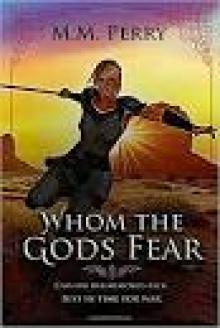 Gods & Mortals
Gods & Mortals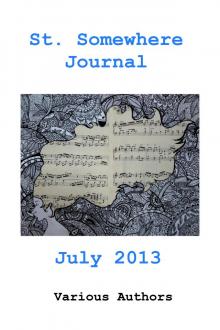 St. Somewhere Journal, July 2013
St. Somewhere Journal, July 2013 firstwriter.com First Short Story Anthology
firstwriter.com First Short Story Anthology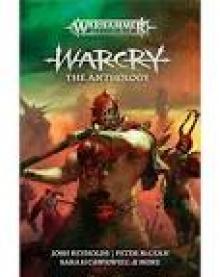 Warcry: The Anthology
Warcry: The Anthology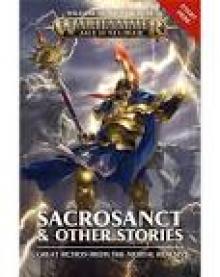 Sacrosanct & Other Stories
Sacrosanct & Other Stories Ultimate Heroes Collection
Ultimate Heroes Collection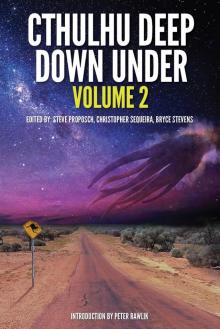 Cthulhu Deep Down Under Volume 2
Cthulhu Deep Down Under Volume 2 Erotic Classics II
Erotic Classics II Dynasties: The Elliotts, Books 1-6
Dynasties: The Elliotts, Books 1-6 Dynasties:The Elliots, Books 7-12
Dynasties:The Elliots, Books 7-12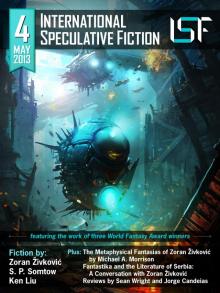 International Speculative Fiction #4
International Speculative Fiction #4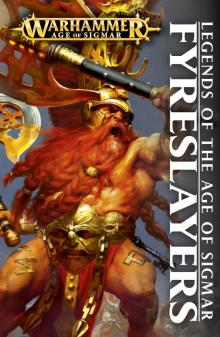 Fyreslayers
Fyreslayers One Night In Collection
One Night In Collection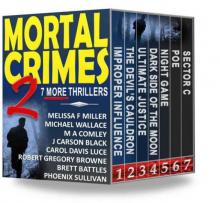 Mortal Crimes 2
Mortal Crimes 2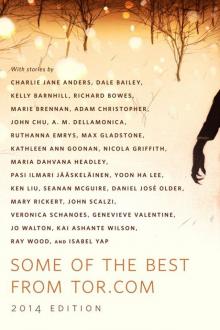 Some of the Best from Tor.com
Some of the Best from Tor.com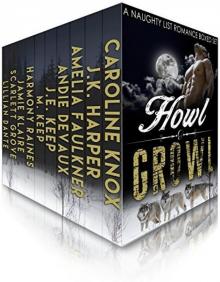 Howl & Growl: A Paranormal Romance Boxed Set
Howl & Growl: A Paranormal Romance Boxed Set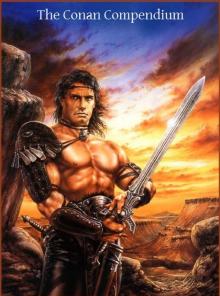 The Conan Compendium
The Conan Compendium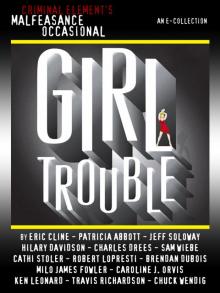 The Malfeasance Occasional
The Malfeasance Occasional Brides of Penhally Bay - Vol 4
Brides of Penhally Bay - Vol 4 Brides of Penhally Bay - Vol 2
Brides of Penhally Bay - Vol 2 Brides of Penhally Bay - Vol 1
Brides of Penhally Bay - Vol 1 School's in Session
School's in Session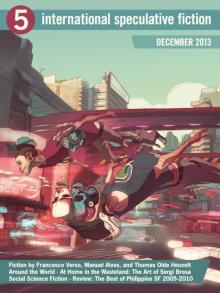 International Speculative Fiction #5
International Speculative Fiction #5 Erotic Classics I
Erotic Classics I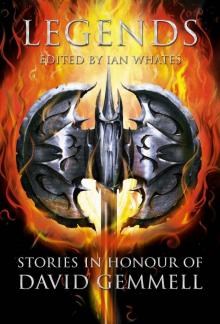 Legends: Stories in Honor of David Gemmell
Legends: Stories in Honor of David Gemmell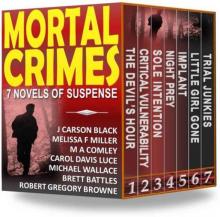 Mortal Crimes 1
Mortal Crimes 1 The Classic Children's Literature Collection: 39 Classic Novels
The Classic Children's Literature Collection: 39 Classic Novels Don't Read in the Closet volume one
Don't Read in the Closet volume one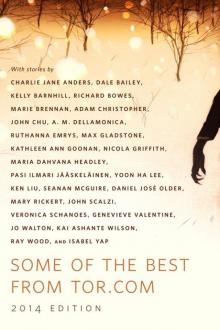 Some of the Best from Tor.com: 2014: A Tor.Com Original
Some of the Best from Tor.com: 2014: A Tor.Com Original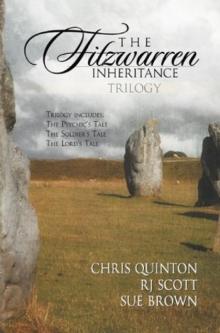 The Fitzwarren Inheritance
The Fitzwarren Inheritance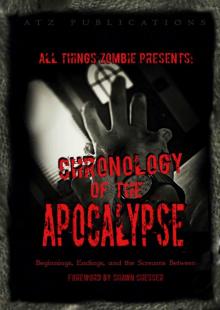 All Things Zombie: Chronology of the Apocalypse
All Things Zombie: Chronology of the Apocalypse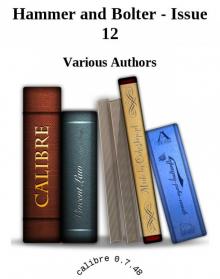 Hammer and Bolter - Issue 12
Hammer and Bolter - Issue 12 Kiss Kiss
Kiss Kiss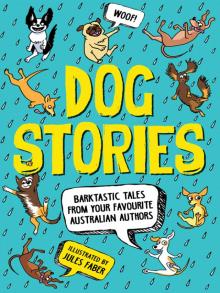 Dog Stories
Dog Stories Bad Blood Collection
Bad Blood Collection